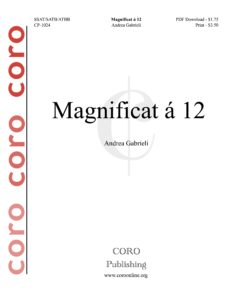Magnificat á 12
Andrea Gabrieli
SSAT/SATB/ATBB
Duration: 4 minutes Difficulty: 5
PDF Download: $1.75 Print: $3.50
Andrea Gabrieli
SSAT/SATB/ATBB
Duration: 4 minutes Difficulty: 5
PDF Download: $1.75 Print: $3.50
Andrea Gabrieli’s setting of the Magnificat text is a quintessential example of the Venetian polychoral style of the Baroque period. This particular piece is found in the Concerti di Andrea et di Gio. Gabrieli published posthumously in 1587 by Angelo Gardano in Venice. Andrea spent a majority of his music life (from 1566 until his death) as organist at St. Mark’s in Venice, one of the most prestigious musical posts in northern Italy. The polychoral style of composition that Andrea created came mainly from working at St. Mark’s. The unique acoustical space with multiple choir lofts in the transepts and presbytery allowed for the experimentation of polychoral compositions. Andrea’s polychoral writing utilizes hierarchical choirs; Choir I is written for higher pitched voices than Choir II, and so on. Also important in Andrea’s writing is the division of the complete Magnificat text between the choirs. Through modern musicological research, we know that performances of polychoral compositions of Andrea, Giovanni Gabrieli, and Claudio Monteverdi would many times include instrumentalists, but for Andrea Gabrieli’s compositions, at least one voice must be present in each choir for the complete text to be presented.
– Philip Moody
Text
Magnificat anima mea Dominum
My soul doth magnify the Lord.
Et exultavit spiritus meus in Deo salutari meo.
And my spirit hath rejoiced in God my Savior.
Quia respexit humilitatem ancillæ suæ:
Because he hath regarded the humility of his handmaid:
ecce enim ex hoc beatam me dicent omnes generationes.
for behold from henceforth all generations shall call me blessed.
Quia fecit mihi magna qui potens est, et sanctum nomen eius.
Because he that is mighty hath done grew things to me: and holy is his name.
Et misericordia eius a progenie in progenies timentibus eum.
And his mercy is from generation unto generations, to them that fear him.
Fecit potentiam in brachio suo, dispersit superbos mente cordis sui.
He hath showed might in his arm: he hath scattered the proud in the imagination of their heart.
Deposuit potentes de sede et exaltavit humiles.
He hath put down the mighty from their seat and hath exalted the humble and meek.
Esurientes implevit bonis et divites dimisit inanes.
He hath filled the hungry with good things: and the rich he hath sent empty away.
Suscepit Israel puerum suum recordatus misericordiæ suæ,
He hath received israel his servant, being mindful of his mercy.
Sicut locutus est ad patres nostros, Abraham et semini eius in sæcula.
As he spoke to our fathers: to Abraham and to his seed forever.
Gloria Patri, et Filio, et Spiritui Sancto:
Glory be to the Father, and to the Son: and to the Holy Ghost:
Sicut erat in principio, et nunc, et semper, et in sæcula sæculorum. Amen.
As it was in the beginning, is now, and ever shall be: world without end. Amen.
-Luke 1:46-55
